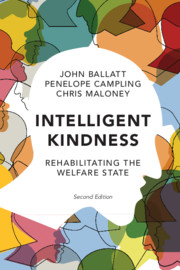Book contents
- Intelligent Kindness
- Reviews
- Intelligent Kindness
- Copyright page
- Contents
- Foreword
- Authors’ Note
- Chapter 1 The Heart of the Matter
- Chapter 2 Rescuing Kindness
- Chapter 3 A Politics of Kindness
- Chapter 4 Building the Case for Kindness
- Chapter 5 Managing Feelings of Love and Hate
- Chapter 6 The Emotional Life of Teams
- Chapter 7 Cooperation and Fragmentation
- Chapter 8 On the Edges of Kinship
- Chapter 9 Unsettling Times
- Chapter 10 Free to Serve the Public?
- Chapter 11 Blame
- Chapter 12 The Hostile Environment
- Chapter 13 The Pull towards Perversion
- Chapter 14 Cultivating Intelligent Kindness
- Chapter 15 Rehabilitating the Welfare State
- Index
- About the Authors
- Acknowledgements
- References
Chapter 14 - Cultivating Intelligent Kindness
Published online by Cambridge University Press: 28 February 2020
- Intelligent Kindness
- Reviews
- Intelligent Kindness
- Copyright page
- Contents
- Foreword
- Authors’ Note
- Chapter 1 The Heart of the Matter
- Chapter 2 Rescuing Kindness
- Chapter 3 A Politics of Kindness
- Chapter 4 Building the Case for Kindness
- Chapter 5 Managing Feelings of Love and Hate
- Chapter 6 The Emotional Life of Teams
- Chapter 7 Cooperation and Fragmentation
- Chapter 8 On the Edges of Kinship
- Chapter 9 Unsettling Times
- Chapter 10 Free to Serve the Public?
- Chapter 11 Blame
- Chapter 12 The Hostile Environment
- Chapter 13 The Pull towards Perversion
- Chapter 14 Cultivating Intelligent Kindness
- Chapter 15 Rehabilitating the Welfare State
- Index
- About the Authors
- Acknowledgements
- References
Summary
So far, we have argued that intelligent kindness should guide the design and organisation of health, social care and welfare services, and shown how the approach will sustain and bring the best out of their hard-working staff. Benefits will be large and small scale, affecting both the organisational culture, and the daily work.
This needs a change in mind-set, and the adoption of a new set of attitudes and beliefs, as we have discussed in detail in the preceding chapters.
- Type
- Chapter
- Information
- Intelligent KindnessRehabilitating the Welfare State, pp. 204 - 226Publisher: Cambridge University PressPrint publication year: 2020



